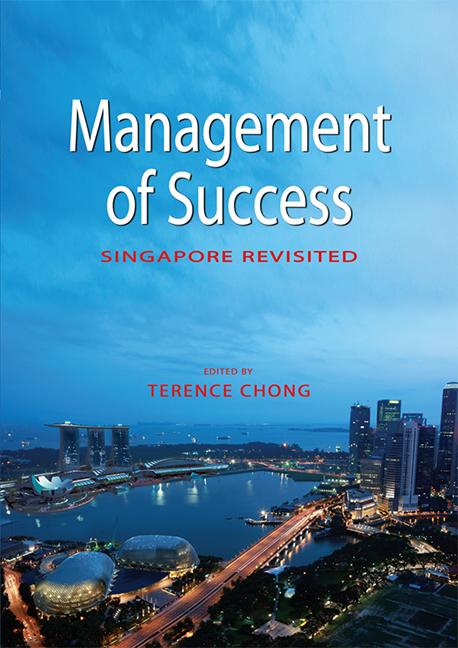Book contents
- Frontmatter
- Contents
- List of Tables and Figures
- Foreword
- Message
- Quote
- Preface
- The Contributors
- 1 Introduction: The Role of Success in Singapore's National Identity
- SECTION 1 SINGAPORE IN THE BIGGER PICTURE
- SECTION 2 LEADERSHIP, POLICY AND POLITICS
- SECTION 3 THE RESTRUCTURING OF THE ECONOMY
- SECTION 4 THE TRANSFORMATION OF SOCIETY
- 11 The Ageing Population
- 12 Managing Labour Flows: Foreign Talent, Foreign Workers and Domestic Help
- 13 Social Mobility in Singapore
- 14 Singapore's Print Media Policy: A National Success?
- 15 Control-shift: The Internet and Political Change in Singapore
- 16 The Transformation of Meritocracy
- 17 Education in Singapore: Sorting Them Out?
- 18 Religious Diversity in Singapore
- SECTION 5 THE LAW
- SECTION 6 MODIFICATION OF THE ENVIRONMENT
- SECTION 7 COMMUNITY AND NATIONAL SECURITY
- SECTION 8 LIFE IN SINGAPORE
- Index
15 - Control-shift: The Internet and Political Change in Singapore
from SECTION 4 - THE TRANSFORMATION OF SOCIETY
Published online by Cambridge University Press: 21 October 2015
- Frontmatter
- Contents
- List of Tables and Figures
- Foreword
- Message
- Quote
- Preface
- The Contributors
- 1 Introduction: The Role of Success in Singapore's National Identity
- SECTION 1 SINGAPORE IN THE BIGGER PICTURE
- SECTION 2 LEADERSHIP, POLICY AND POLITICS
- SECTION 3 THE RESTRUCTURING OF THE ECONOMY
- SECTION 4 THE TRANSFORMATION OF SOCIETY
- 11 The Ageing Population
- 12 Managing Labour Flows: Foreign Talent, Foreign Workers and Domestic Help
- 13 Social Mobility in Singapore
- 14 Singapore's Print Media Policy: A National Success?
- 15 Control-shift: The Internet and Political Change in Singapore
- 16 The Transformation of Meritocracy
- 17 Education in Singapore: Sorting Them Out?
- 18 Religious Diversity in Singapore
- SECTION 5 THE LAW
- SECTION 6 MODIFICATION OF THE ENVIRONMENT
- SECTION 7 COMMUNITY AND NATIONAL SECURITY
- SECTION 8 LIFE IN SINGAPORE
- Index
Summary
NET-IMPACT
One night in May 2006, a Singaporean man went to Hougang town to attend an election rally organized by the opposition Workers’ Party. He found the rally site impenetrably packed, so he tried to get a better view from an adjacent apartment block. The lift lobby was full of other people with the same idea, so he climbed the stairs. Only on the thirteenth floor did he finally find some space in the open corridor overlooking the field. He took photographs of what he saw below: a sea of people surrounding a brightly lit stage. He listened to the opposition candidates talk about rising medical bills and other trials of life under People's Action Party (PAP) rule. Later he observed how one elderly man near him was moved to tears. Then, he went home.
It was what Alex Au did next that cemented his place in the story of the 2006 General Election. He posted his report of the rally, “On Hougang Field”, on his blog, Yawning Bread.1 His photo of the crowd was picked up and passed around online with the kind of enthusiasm reserved elsewhere for exposés of sex scandals or high-level corruption. Like these more sensational genres of news, the image of Hougang field was not supposed to go public. For more than two decades, the national newspapers and broadcasters had obeyed an unwritten rule never to show wide shots of opposition rally crowds, which are usually more engorged and energized than the ruling party's events.
Websites such as Alex Au's Yawning Bread blog showed that the elite media could no longer dictate what would go public in Singapore. Their impact, however, should not be exaggerated. The profusion of independent writing and video recordings during the election campaign did not have an appreciable effect on the outcome. The PAP was defeated only by the two incumbent opposition Members of Parliament; it secured two thirds of the popular vote. The lack of any immediate impact on PAP hegemony is not surprising. After all, the independent online media was not revealing anything that the public did not already know. They were not uncovering government misdeeds. Au's Hougang Field picture did not contain new information; it simply held up a mirror to the public. Any consequences of such media activism would be long-term and subtle.
- Type
- Chapter
- Information
- Management of SuccessSingapore Revisited, pp. 257 - 271Publisher: ISEAS–Yusof Ishak InstitutePrint publication year: 2010



